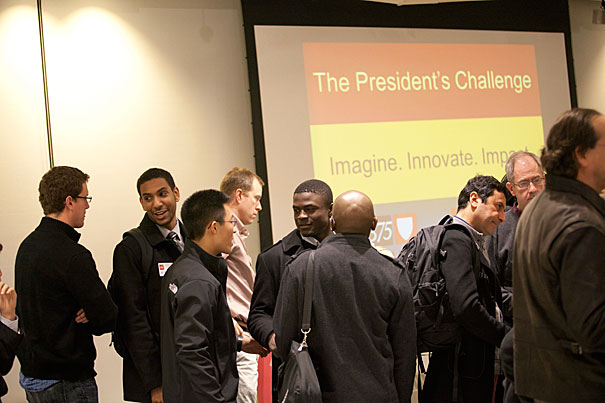
“A large number of teams applied to the President’s Challenge, and the quality of their submissions was truly impressive. We’re off to a great start,” said Provost Alan Garber, who organized the judging panel along with Harvard Business School Professor Bill Sahlman. In February, the teams gathered at the i-lab to discuss their plans.
File photo by Kris Snibbe/Harvard Staff Photographer
10 finalists in President’s Challenge
Teams are developing innovative solutions to global problems
Harvard University announced today the selection of 10 teams of finalists in the President’s Challenge for social entrepreneurship. President Drew Faust created the challenge to encourage student teams from across the University to develop entrepreneurial solutions to five of the world’s most important social issues.
“The world’s most pressing challenges are borderless, and so solutions must transcend boundaries as well,” said Faust. “It is gratifying to see how fully these finalists have embraced the spirit of collaboration, of innovation, and of curiosity that is the hallmark of the i-lab. I am impressed with both their engagement with new ideas and their novel ways of enabling those ideas to reach the wider world.”
The finalists, selected from a pool of more than 170 teams, will each receive a $5,000 grant, dedicated space in the i-lab, which is more formally known as the Harvard Innovation Lab (i-lab), and mentoring from experts to further develop their solutions. The winning proposals range from creating interactive math and science electronic textbooks to bringing the car-sharing business model to Indian cities.
Next month, Faust will announce a grand-prize winner and up to three runners-up, who will share a $100,000 purse.
Entrants were asked to tackle one of five issues highlighted by a panel of Harvard faculty in February. The issues of clean water, personal health, empowered education, global health, and clean air were chosen for their widespread prevalence in societies globally. Two ideas for each issue category were selected for the finalist round.
“A large number of teams applied to the President’s Challenge, and the quality of their submissions was truly impressive. We’re off to a great start,” said Provost Alan Garber, who organized the judging panel along with Harvard Business School Professor Bill Sahlman. “The proposals are ambitious and have the potential to make a real difference in the world. It’s gratifying to see how the students develop their ideas at the i-lab. We expect that they will inspire others to bring their own curiosity, resourcefulness, commitment, and creativity to the i-lab as well.”
Sahlman, the Dimitri V. D’Arbeloff — MBA Class of 1955 Professor of Business Administration, who was a nonvoting member of the judging committee for the challenge, said of the process, “We asked a number of distinguished faculty members and alumni to identify those student teams that had the greatest potential to move the needle in each domain. The plans were outstanding, and the selection process correspondingly difficult.”
The 10 finalist teams, made up of three to six members include:
In the clean water category
- Team SPOUTS of Water’s proposal is to create a self-sustaining ceramic water filter factory in Uganda.
- Team Slum Sanitation Solutions proposes placing toilet systems in slums and monetizing the systems by using biodigesters to create fuel and fertilizer from waste.
In the personal health category
- Team Balanced Kitchen proposes a casual-restaurant concept that offers great-tasting and nutritionally balanced food at competitive prices through interactive menus based on the latest health research.
- Team ScentShare plans to harness and capitalize on the power of scent by using odorants on small chips as a virtual placebo to improve personal well-being and to reduce appetite and increase satiety in users.
In the empowered-education category
- Team School Yourself proposes bringing books alive for a new generation of students accustomed to interactive games by creating immersive and interactive electronic textbooks in math and science for high school and college students.
- Team Crimson.com will enable better peer collaboration on schoolwork, using a nonmonetary incentive scheme and the development of a suite of learning and teaching applications.
In the global health category
- Team Revolving Fund Pharmacy proposes tackling issues involving delivery of life-saving medications by creating a supply chain model for government health facilities in Kenya.
- Team Vaxess proposes using silk to stabilize vaccines, eliminating the use for cold-chain transport, which lowers distribution costs and puts more vaccines in the hands of people in remote areas and developing countries, where they are needed most.
In the clean air category
- Team Zoom hopes to bring the car-sharing business model to Indian cities, providing vehicle availability to millions while removing vehicles from the road and reducing miles driven.
- Team Essmart proposes bridging the gap between producers of essential technology and global consumers through proposed distribution plans.
Gordon Jones, director of the i-lab, said, “At the i-lab, we help students bring all kinds of projects forward to the world, but are especially excited by students in the President’s Challenge creating measurable impact on some of the biggest social problems around them.”
The i-lab will help finalist teams advance their ideas during the phase, culminating in the selection of one grand-prize winner and up to three runners-up. The grand-prize winner also will be awarded dedicated work space in the i-lab, mentoring, and access to expert resources through August.





